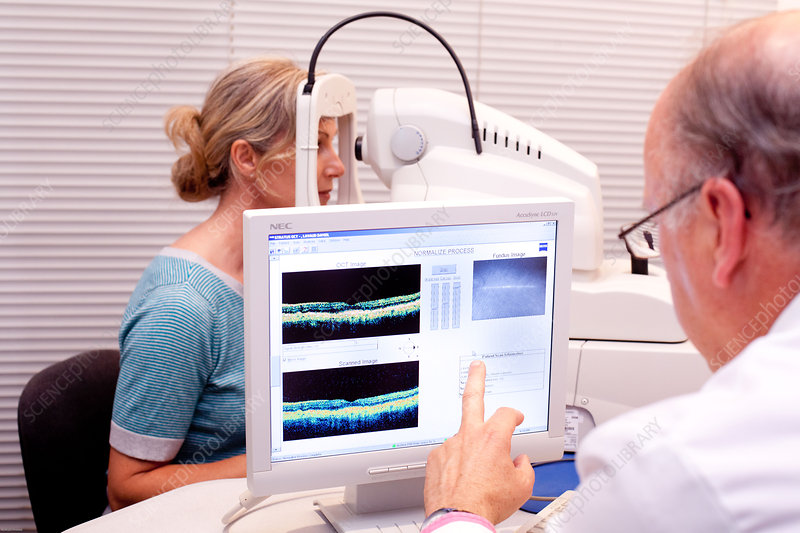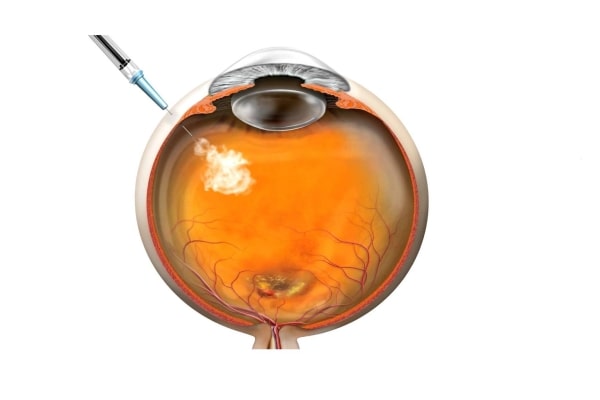Private Treatment for Macular Degeneration (AMD) in Birmingham
9 Jun 2025
Wet age-related macular degeneration (AMD) is a common eye condition that causes loss of central vision by abnormal blood vessels in the retina. It usually affects people over 50. In wet AMD, new blood vessels grow under the retina and leak fluid or blood, blurring the central vision. If left untreated, wet AMD can progress rapidly (sometimes within months), significantly worsening vision. At our Birmingham macular clinic, we offer expert private wet AMD treatment with prompt appointments and personalised care. We provide free 10-minute video consultations (Monday evenings) for new patients. Book Your Complimentary Suitability Assessment- video consultation to discuss your case with our retina specialist.
Understanding Wet Age-Related Macular Degeneration
Wet AMD is a form of age-related macular degeneration. It occurs when abnormal blood vessels grow under the retina and leak fluid or blood. This damages the macula and causes central vision problems such as blurring or wavy lines. Wet AMD typically leads to more rapid vision loss than dry AMD. Importantly, AMD affects only central vision; peripheral (side) vision is usually preserved, so the condition does not cause total blindness. There is currently no cure for AMD, but early detection and treatment can slow its progression and help maintain sight.
Symptoms and When to Seek Help
Common symptoms of wet AMD include:
- Blurred or distorted vision: You may see a blurred or grey patch in the centre of your vision.
- Wavy lines: Straight objects like door frames or text can look bent or wavy.
- Dark spot (central scotoma): A grey or dark spot may appear in the middle of your vision.
- Light sensitivity and glare: You may notice increased sensitivity to bright light or see flickering lights.
- Painless changes: Wet AMD is usually not painful and does not change the appearance of the eye.
If any of these symptoms develop suddenly or severely, seek immediate help. For example, a curtain-like shadow or rapid loss of vision requires an urgent eye exam. Early detection and treatment are vital to prevent permanent vision loss.

Causes and Risk Factors
While the exact cause of AMD is unknown, certain factors increase the risk:
- Age & genetics: Risk rises dramatically after age 50, especially if a parent or sibling has AMD.
- Smoking: Current or past smoking is strongly linked to AMD development.
- Cardiovascular health: High blood pressure, high cholesterol, and obesity (BMI ≥30) can contribute to AMD.
- Unhealthy lifestyle: Diet low in vitamins/antioxidants and lack of exercise are associated with AMD progression.
If you have these risk factors, attend regular eye exams and report any vision changes promptly.
Diagnosis
AMD may be first suspected during a routine eye exam by an optometrist or GP. If wet AMD is suspected, an urgent referral to an ophthalmologist is recommended. An ophthalmology macula specialist will dilate your pupils and examine the retina. They commonly use optical coherence tomography (OCT) to capture detailed cross-sectional images of the retina and detect any fluid beneath the macula. If needed, OCT angiography or fluorescein angiography (a dye test) can confirm leaking blood vessels. Early diagnosis and prompt treatment are crucial for the best outcomes.

Treatment Options for Wet AMD
Treatment focuses on stopping abnormal vessels and preserving vision. Main therapies include:
- Anti-VEGF intravitreal injections: The standard of care for wet AMD is regular eye injections of anti-VEGF medications. These drugs (such as ranibizumab, bevacizumab, aflibercept, and faricimab) block the signals that cause new blood vessel growth and leakage. Typically, you will receive a series of 3 initial monthly injections (a “loading dose”), then ongoing injections as needed. For example, Lucentis (ranibizumab) is often given every 4 weeks, whereas aflibercept and faricimab can be dosed every 8–12 weeks or longer. Follow-up exams with OCT scans determine the injection schedule for each patient.
Aside from these, supplements (vitamins, lutein, zeaxanthin) and low-vision aids may be recommended.
Injections are done under local anaesthetic in a sterile clinic setting. Most patients undergo repeated injections (typically several times per year) to keep the disease under control. These injections are generally very safe and highly effective at stabilising vision, and many patients experience significant benefit from treatment.

Why Choose Private Treatment in Birmingham
Choosing private care can offer several advantages:
- Shorter wait times: Private clinics often schedule your initial assessment and treatments much faster than NHS services.
- World-class expertise: Mr. Dilraj Sahota has undergraduate training from Oxford University and Fellowship training in Medical Retina and AMD from Moorfields Eye Hospital, London. He offers leading expertise and use advanced imaging (like OCT angiography) for precise diagnosis.
- Latest treatments: We have access to all licensed therapies and clinical trials, ensuring you receive the newest AMD treatments as soon as possible. There are no NHS treatment constraints (under the NHS your vision must meet a certain criteria to be allowed to be treated)
- Personalised care: Appointments are tailored to you, with more time to address concerns and create a bespoke treatment plan.
- Comprehensive ocular services: In addition to AMD, we also manage conditions like retinal vein occlusion and other macular diseases as well as cataract, providing end-to-end eye care.
Booking and Consultations
Mr. Sahota offers complimentary 10-minute video consultations on Monday evenings to offer a friendly introduction to how he can help. This gives you the opportunity to describe your symptoms and ask questions without any obligation. To schedule, simply book a free video consultation via our online booking system. We will confirm your appointment and send any instructions.
If you prefer an in-person visit, we can arrange a full consultation at our Birmingham clinic. His private practice is based at Edgbaston Eye Consultants and the Ramsay Westbourne Centre in Edgbaston, Birmingham. In either case, you will receive a clear explanation of your diagnosis and a recommended treatment plan as well as a prognosis for the affected eye and fellow eye.
FAQ: Common Questions
- Does wet AMD cause total blindness? No. Wet AMD affects the macula, so it primarily damages central vision. Peripheral (side) vision usually remains intact, meaning complete blindness is rare. However, central vision loss can still significantly impact daily activities.
- What are the risks of eye injections? Intravitreal injections are very safe when performed by specialists. Most patients experience mild discomfort or redness that resolves quickly. Rare complications (infection, bleeding) can occur; if you notice increasing pain, redness, or vision changes after an injection, seek prompt care. Endophthalmitis rates are typically 1 in 2000 but this is a severe complication that can cause loss of vision.
- How often are treatments needed? Typically, treatment starts with monthly injections (for at least 3 months). After that, your doctor may extend the interval based on how your retina responds. Many patients receive injections every 1–3 months long-term to maintain vision.
- Is there a cure for AMD? Currently there is no cure for AMD. Treatments like anti-VEGF injections do not cure the disease but can prevent further vision loss. In some cases, patients even recover some lost vision, but the main goal is to halt progression.
Take Control of Your Vision
Wet AMD can be effectively managed with timely treatment. If you experience symptoms or have been diagnosed with wet AMD, act now – early intervention is key. Book Your Complimentary Suitability Assessment video consultation or call our clinic to schedule an appointment. Mr. Sahota, AMD specialist, will guide you through the next steps and help protect your vision.
Disclaimer: This information is for educational purposes only and is not a substitute for professional medical advice. Always consult your ophthalmologist or eye care provider for personal guidance.
Sources: Authoritative medical and patient resources (NHS, Moorfields, NICE, Macular Society, etc.). Each claim is backed by evidence from these trusted sources.
